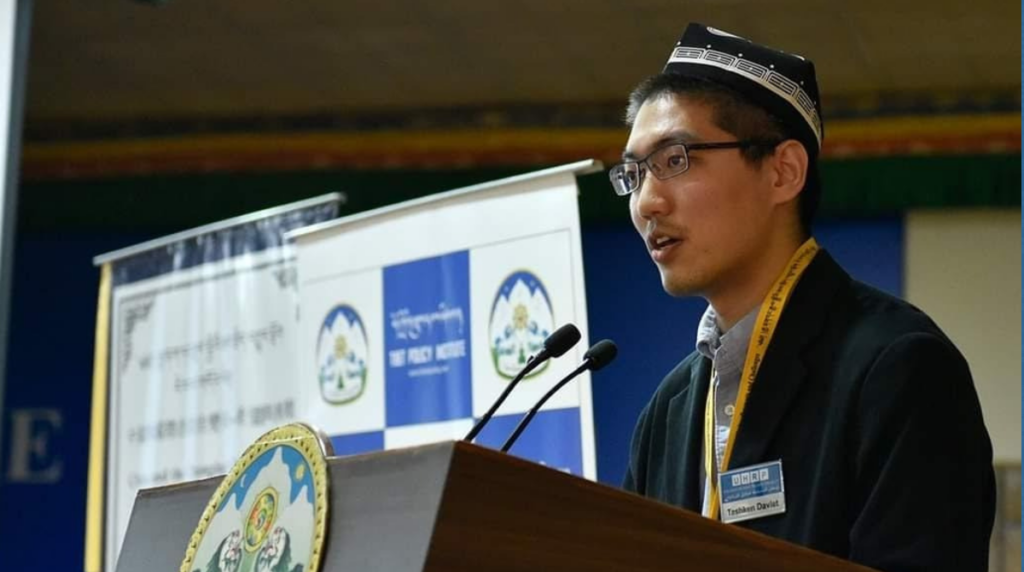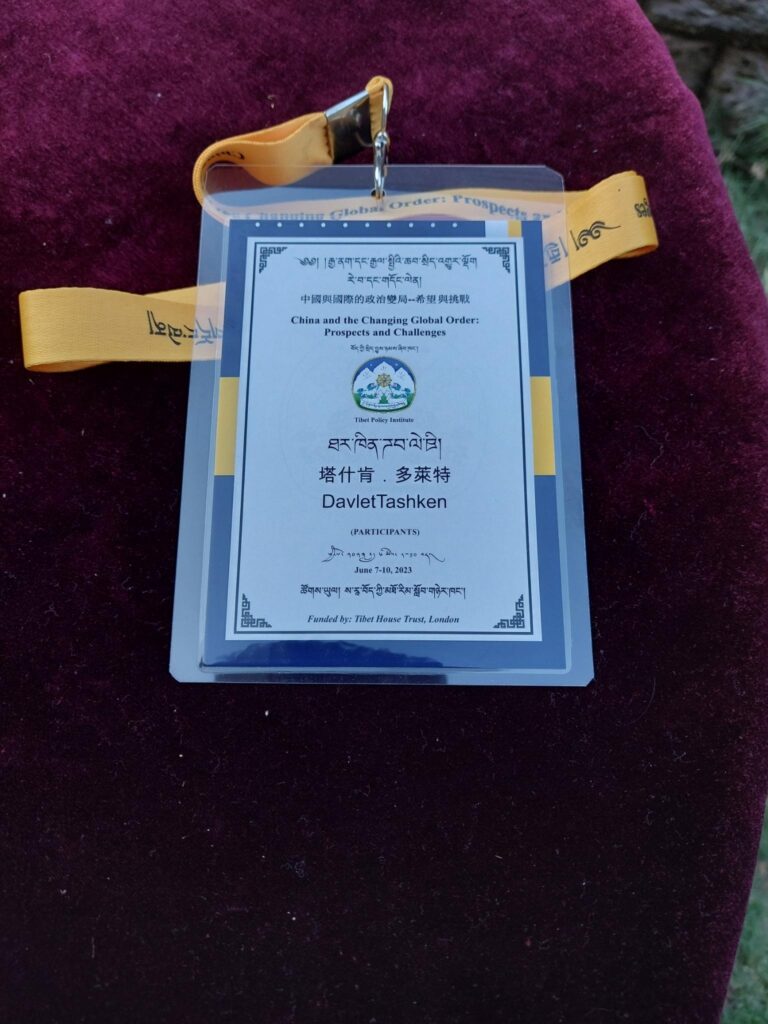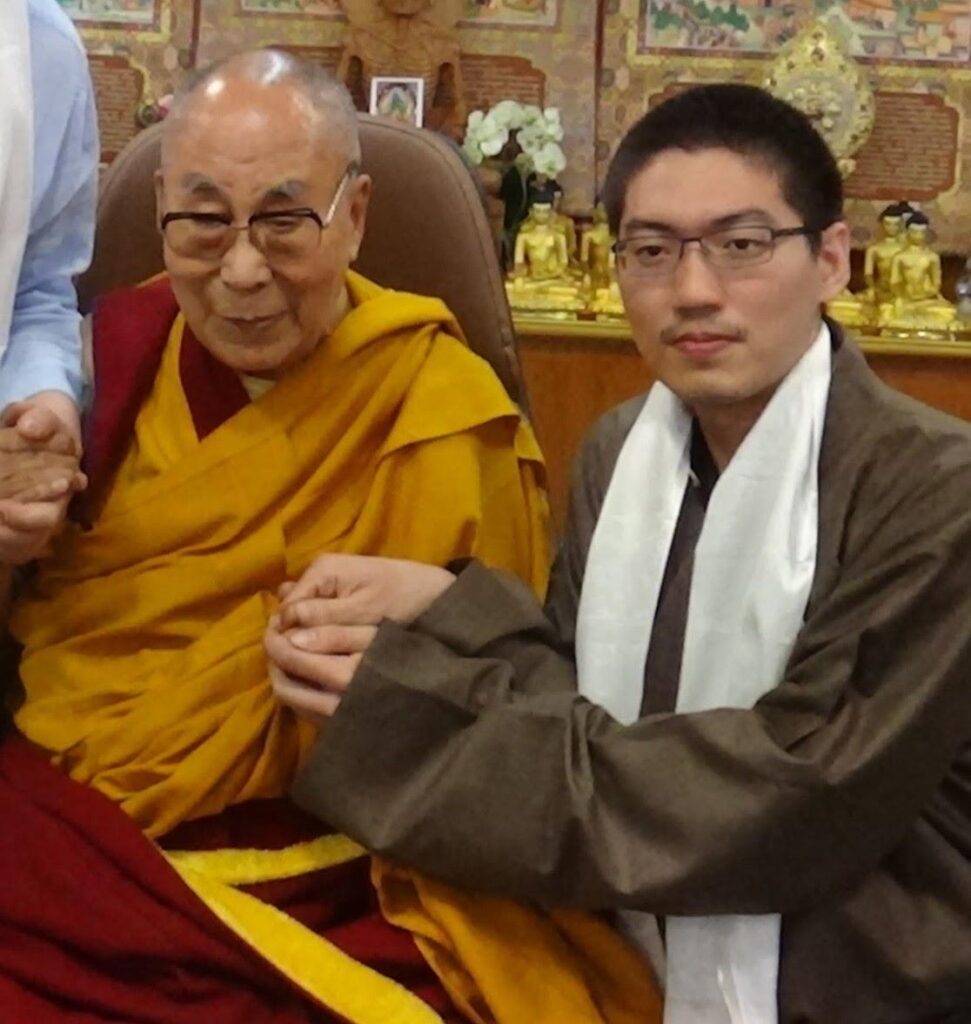Uyghurs and Tibetans: A Shared Agenda for National Survival and Justice

October 5, 2023
A UHRP Insights column by Tashken Davlet, Outreach Specialist, Uyghur Human Rights Project
This article was composed for UHRP’s trip to Dharamsala. The author of this article was invited by the Tibet Policy Institute (TPI) to attend the conference “China and the Changing Global Order: Prospects and Challenges,” where he delivered this report.



Uyghurs and Tibetans: A Shared Agenda for National Survival and Justice
In 2011, Chen Quanguo (陳全國) took up his position in the Tibet Autonomous Region, with his new “security policies.” During his rule, there was a sharp rise in the number of self-immolations by Tibetan people.
In 2016, after silencing Tibet, Chen Quanguo then turned to perfect the police state that is Xinjiang Uygur Autonomous Region. Though he left XUAR in 2021, the region is still brutally oppressed, as the world watches in shock at the human rights crisis known as the Uyghur Genocide.
One’s suffering shouldn’t be compared to another’s, but I think when an Uyghur and a Tibetan say “we feel you” to each other, it has a deep meaning.
The Uyghur Genocide
With the news of the “re-education camps” emerging back in 2017, the world started to realize that something shocking was happening in the Uyghur region.1UHRP also refer to the Uyghur homeland as “East Turkistan.” Many Uyghurs prefer these toponyms to those of “Xinjiang” and the “Xinjiang Uyghur Autonomous Region,” which they see as offensive colonial terms. Then, one year ago, the infamous leaked documents, called the “Xinjiang Police Files,” showed the world once again concrete evidence of the atrocity crimes, and perhaps more importantly, the faces of those who are suffering.
Today, most of the world knows that the Uyghurs have been subject to atrocity crimes that include arbitrary detention, enforced disappearances, forced labor, torture, sexual violence, coercive birth prevention campaigns, and the widespread destruction of cultural and religious sites. And just like Tibetan children, Uyghur children are also subjected to the notorious “boarding school” policies, forcibly severed from their families, and punished if they do not abandon their language and culture.
But the suffering and threats don’t stop with those who are caught under the CCP’s control. The CCP has mounted a multi-million dollar effort to intimidate people overseas. The weight and suffering of the Uyghurs who live in the diaspora is an unseen yet multi-generational scar. The economic relationship between the People’s Republic of China (PRC) and the world is polluting global supply chains that reach every country.
Transnational Repression
Since 2002, the PRC has engaged in an unparalleled campaign of transnational repression as part of its efforts to coerce and control Uyghurs living abroad. As a result, members of the Uyghur diaspora have experienced the long reach of China’s authoritarian state in the form of relentless harassment, intimidation, and coercion. This campaign of fear expanded dramatically in 2017 as China embarked on a policy course of mass repression and internment in the Uyghur Region. For many years, UHRP has meticulously documented the Chinese government’s use of transnational repression against Uyghurs and the evolving nature of its strategy to harass, intimidate, and silence Uyghurs abroad.
Many Uyghurs living in the democratic world continue to have their rights—guaranteed to them by democratic governments—violated by the Chinese government. Uyghurs, and many others, have their freedoms curtailed by state-aligned actors through data collection, surveillance, intimidation, and harassment. China’s authoritarianism extends well beyond its borders. Further, our findings suggest that non-Uyghurs are increasingly targeted by this campaign, threatening their freedoms and individual rights.
With the recent news about the CCP’s secret overseas police stations in New York, and at least 102 in 53 countries around the world, we urge the governments of the free world to take more action in combating these threats.
On March 16, the “Transnational Repression Policy Act” was introduced in the U.S. Congress on a bi-partisan basis. But it is still the first anywhere in the world, and more parliaments must step up to defend their own constitutional rights and protect dissidents who are living in their countries. This law aims “to hold foreign governments and individuals accountable when they stalk, intimidate, or assault people across borders.” To combat transnational repression on U.S. soil, the law would:
- Require training for government staff on identifying and understanding transnational repression, and authorize funding to develop related curriculum;
- Instruct the intelligence community to identify perpetrators of transnational repression and their tools, and share information with partners;
- Establish a tip line for victims or witnesses to report instances of transnational repression
- Require national law enforcement agencies to have meetings and consultations with communities at risk; and
- Require the President to identify and sanction foreign individuals engaging in transnational repression.
Recommendations
Democratic states and international organizations must vigorously counter the Chinese government’s illegal extra-territorial repression. Governments should impose targeted sanctions on those responsible for acts of transnational repression; ensure that their own border enforcement, immigration, cybersecurity, and law enforcement personnel are vigilant in protecting citizens’ rights; and work in coalition for a multilateral response in forums such as Interpol and the UN.
All governments should pass a “Transnational Repression Policy Act” to require government agencies to protect their own citizens and residents, and impose sanctions on those who commit transnational crimes.
All governments should endorse the “Declaration of Principles to Combat Transnational Repression,” which has been signed by Australia, Germany, Chile, Estonia, Kosovo, Latvia, Lithuania, the Slovak Republic, and the U.S.
Suffering in Exile
Uyghurs in the diaspora are experiencing another kind of humanitarian crisis as well. Uyghurs living outside the Uyghur region face challenges including enforced statelessness and vulnerability to refoulement, loss of livelihoods and businesses, denial of access to healthcare and schools when they lack proper documentation, single-parent families without a primary provider, homelessness, unaccompanied minors, psychological trauma, the trauma of cultural loss. This is apart from the ongoing transnational harassment, threats, and cyberattacks.
While there are some organizations that are helping the Uyghurs, their ability to meet the needs of Uyghurs in diaspora communities is limited by a lack of resources for providing material humanitarian aid. Community and generational trauma have hardly been addressed due to stigma, cultural barriers, and limited access to healthcare.
Recommendations
We call for governments to publicly affirm a policy of never deporting Uyghur refugees and asylum seekers to China; expedite Uyghur political asylum and refugee applications; and prioritize humanitarian acceptance of stateless and at-risk Uyghur refugees currently exposed to reprisals or deportation in third countries. Governments also need to show they have not abandoned the victims and secondary survivors of genocide to fend for themselves; they need to begin funding survivor-centered programs for healthcare, education, livelihoods, and other humanitarian relief.
Corporate Complicity
We’ve also been highlighting the danger of staying “business as usual” with a regime that is committing atrocity crimes. As the research about the camps and forced labor circulate the globe, it became very clear that the “Made in China” goods might be tainted with force labor, and the corporations sourcing from China — and certainly sourcing from the Uyghur region — risk complicity with genocide. The U.S. has passed the Uyghur Forced Labor Prevention Act to protect its people from buying goods made by modern slaves, and many entities are sanctioned.
No economic or environmental imperative can justify profits from the genocidal state-imposed forced labor of Uyghurs.
The second issue is what we call “genocide tech.” Many Chinese surveillance and DNA companies are directly involved in enabling the genocidal policies. These include Hikvision, Dahua, DJI, Tiandy, BGI, iFlytek, and others.These companies have signed multi-million-dollar contracts to build the “open-air prison” in the Uyghur homeland, and to implement the forced DNA collection from the people of Tibet and East Turkistan. The companies named above are all under U.S. human rights sanctions. Incredibly, these companies are still selling their products to consumers around the world. If you search for “DJI drones” on Amazon or eBay, or on Flipkart here in India, or Shoppee or Ruten in Taiwan, for example, you can find hundreds of DJI drones and cameras.
Recommendations
We call for the free world to end “business as usual” while taking more coordinated actions to protect our values of freedom, democracy and human rights. Governments must ban imports of forced labor goods. Governments must ban contracts, sales, and investment in PRC “genocide tech” surveillance and DNA-related companies.
Conclusion
We, who suffer under the CCP, each have our own cultures, languages, religions, and history, but we are all pursuers of freedom and we stand in strong solidarity. We appreciate the initiative of the Central Tibetan Administration, in convening a conference bringing together people of differing backgrounds, to plan together how we can campaign to achieve justice and national survival.
We take hope and inspiration from the compassionate tenacity of the Tibetans, the unyielding creativity of the Hongkongers, the resolute determination of the Uyghurs, the always-advancing resolve of the Taiwanese, and many, many others who fight and stand with us in our righteous cause.
The free world is encouraged by the bravery of the Ukrainian people. The whole world can see the real threat to our peaceful life, and is slowly taking action. In this ever-changing global order, the powerful regimes are influential indeed, but we who work on the rights field are by no means small actors. In fact, we’re on the frontline of protecting the values we hold dear.
UHRP stands ready. We are filled with a spirit of hope and renewed determination, to be able to gather with friends who share the same values. We are honored to stand shoulder to shoulder with our allies, in a spirit of brotherhood and sisterhood.
